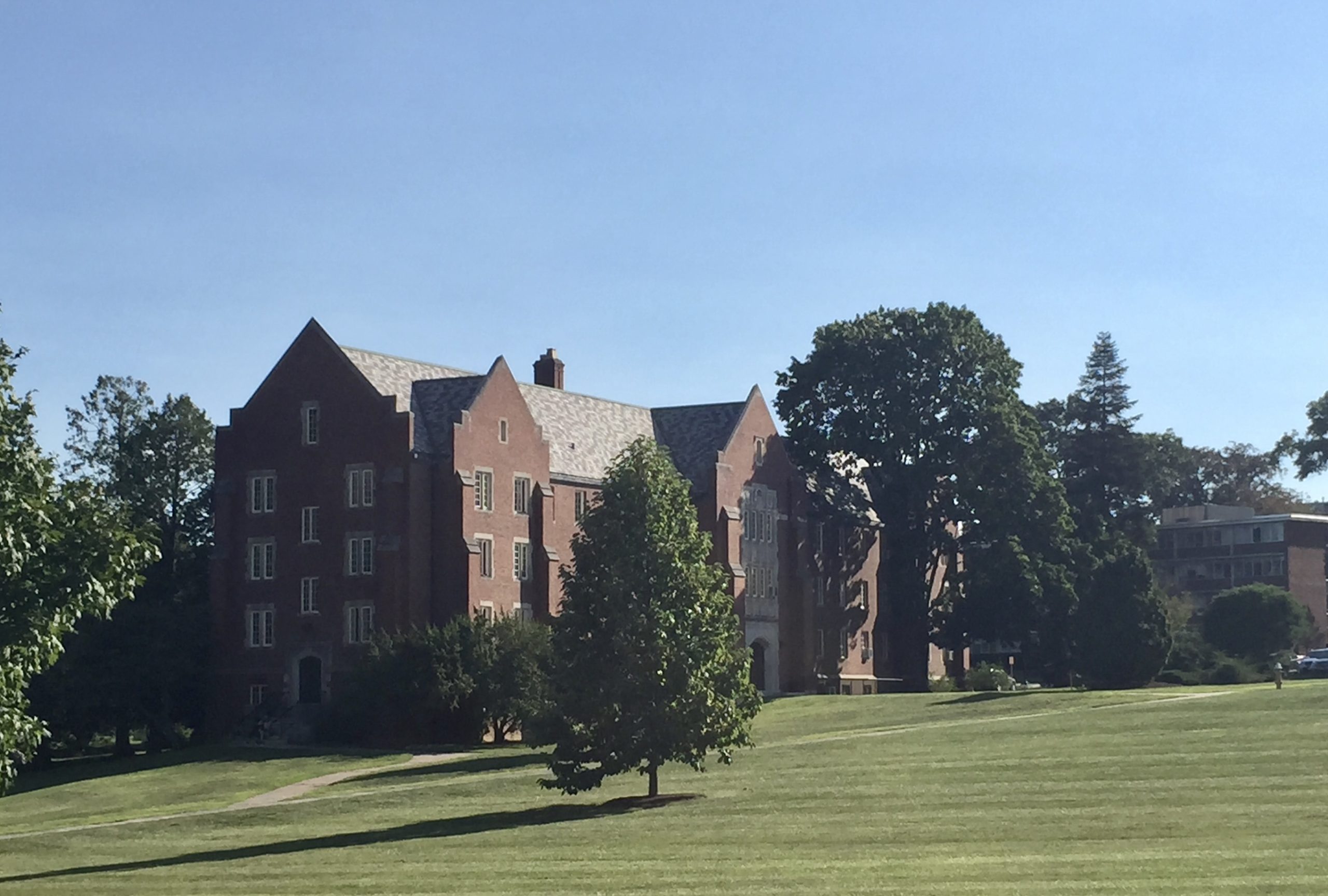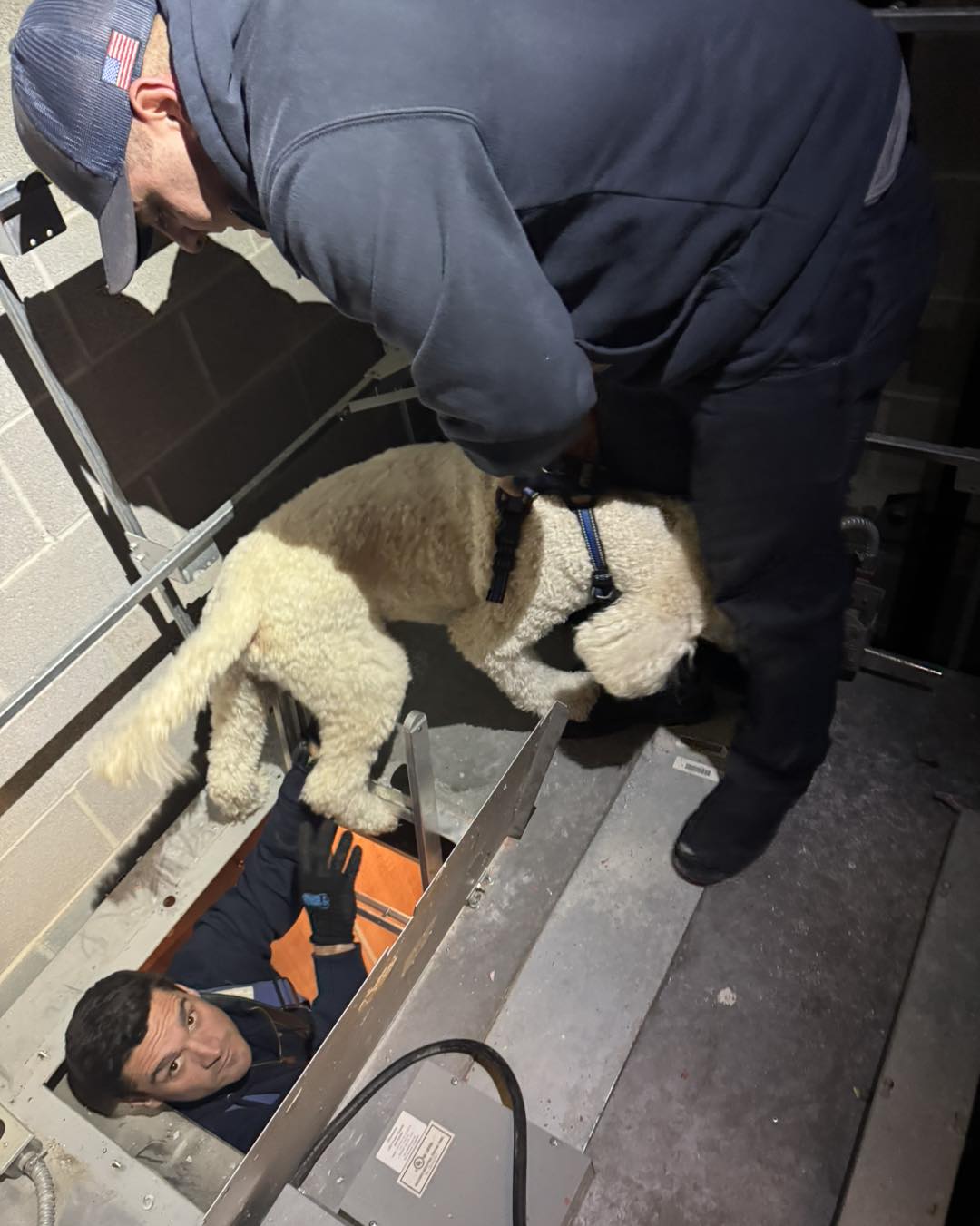Conard Students Participate in Teen Dating Violence Awareness Roundtable with U.S. Sen. Blumenthal

Audio By Carbonatix
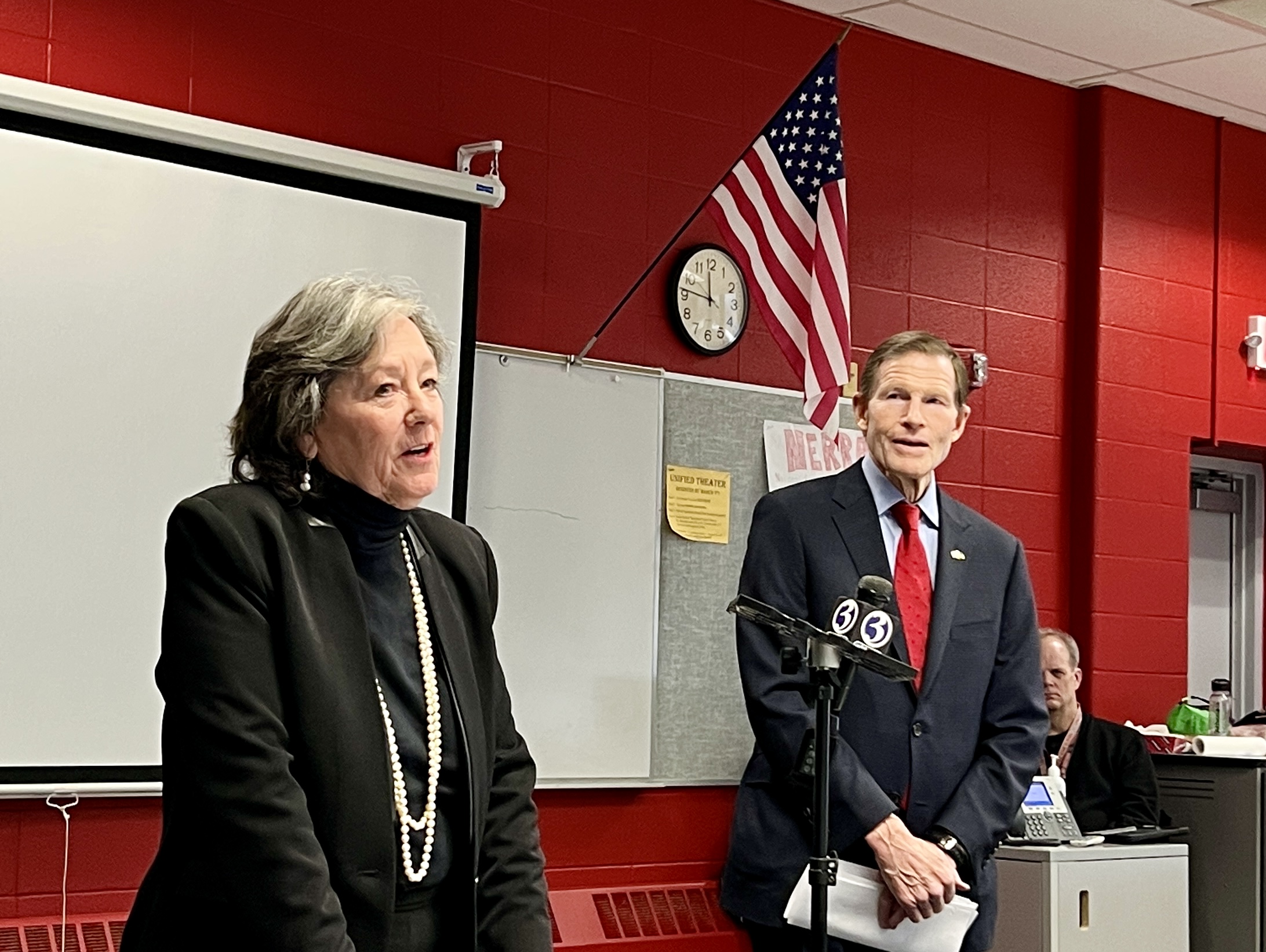
U.S. Sen. Richard Blumenthal (right) and Interval House President and CEO Mary-Jane Foster lead a roundtable on teen dating violence prevention at Conard High School. Photo credit: Ronni Newton
U.S. Sen. Richard Blumenthal and Interval House President and CEO Mary-Jane Foster spoke with Conard students Monday at a roundtable focused on domestic and teen dating violence.
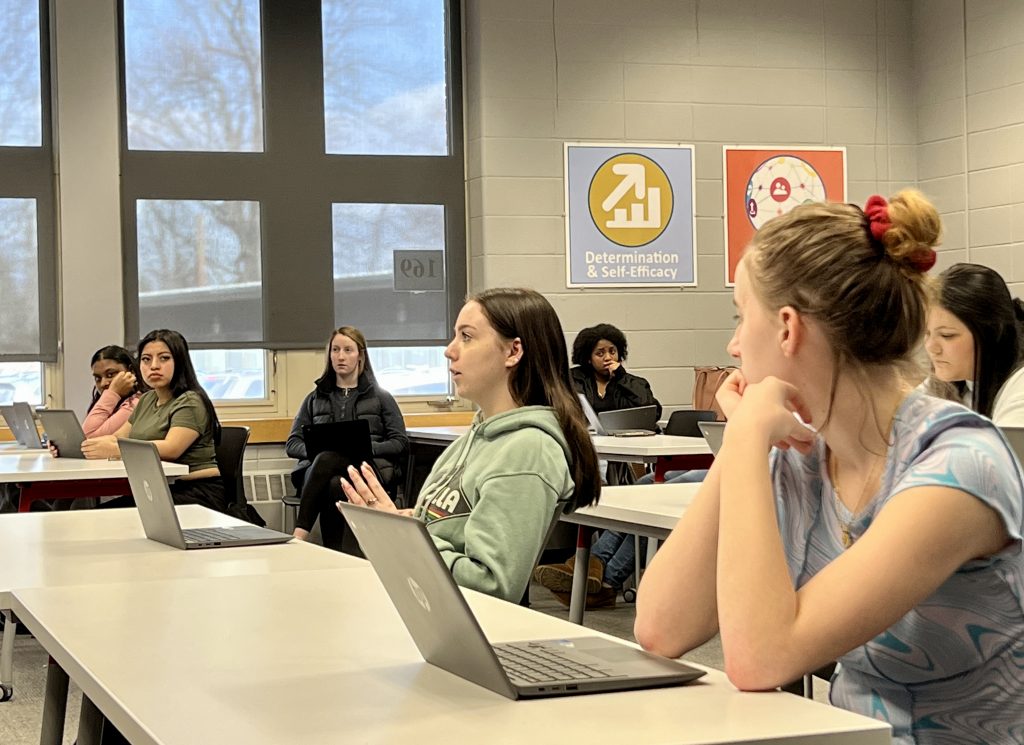
Students at Conard High School share experiences and concerns, and ask questions at a roundtable on teen dating violence prevention. Photo credit: Ronni Newton
By Ronni Newton
There were 38 Conard High School students attending a roundtable discussion with U.S. Sen. Richard Blumenthal and Interval House President and CEO Mary-Jane Foster on Monday morning, listening intently and sharing their thoughts about a topic which likely has affected – if not themselves – then someone they know.
One student said her friend had been in a relationship that “got physical,” and her now ex-boyfriend had isolated her from her friends and family.
Another student shared a story of a family member who had been in an abusive marriage for more than 20 years before listening to others and finally getting divorced.
Still another student shared a very person story, telling classmates that she had been a victim of domestic and teen dating violence. “I think it’s not just the emotional strength,” she said of the challenge of leaving the relationship. “If you’re in long-term relationship with that person, like I was, you remember what the beginning was like and how nice and charismatic that person can be, and how much fun you had spending time with them.”
February is Teen Dating Violence Awareness and Prevention Month nationally, Blumenthal said, with the “prevention” added to bring more attention to a problem that has increased, particularly since the COVID-19 pandemic.
“It is estimated that one out of every three teenagers is a victim at some point of teen dating violence,” Blumenthal said. The Centers for Disease Control and Prevention says it’s one out of every 10, he said, asking the students to consider how prevalent they think it is, and thanking them for having the courage to participate in the roundtable.
“We know it is so prevalent that young women are victims of it at a rate that should not be acceptable, and the question is what to do,” said Blumenthal. He said he has a daughter and three sons, now grown, but said he was intensely worried about this topic when they were in high school, particularly the potential for his daughter to be a victim. “We know it’s not just physical, it can be emotional, it can be verbal.”
Concerns include the trauma – physical and emotional – that can be manifested in various forms that have a lasting impact, said Blumenthal. “And we know it is preventable, and a lot of it is awareness. A lot of it is just being honest, removing some of the stigma and possibly embarrassment.”

From left: Interim Superintendent Andy Morrow, Assistant Superintendent Paul Vicinus, Board of Education Chair Lorna Thomas-Farquharson, and Department Supervisor Brian Cohen. Photo credit: Ronni Newton
Foster leads Interval House, the state’s largest domestic violence agency which serves Hartford and 23 towns in the surrounding area. The nonprofit operates a shelter for women and children and assists many others, including males, who are victims of domestic violence.
West Hartford receives the fourth-most services among the towns in Interval House’s region, after Hartford, Manchester, and East Hartford.
“Last year we worked with 6,800 victims and survivors of domestic violence,” Foster said. The youngest resident to have stayed in the safe house was 17 and the oldest was 88. Stays have varied in length from three days to eight or nine months.
“Domestic violence, intimate partner abuse, can happen to anyone, any time, and it’s intergenerational,” she said. Interrupting that cycle and changing the trajectory means “understanding what a healthy relationship is, understanding that you are worthy, and there is never an excuse for abuse.”
That cycle, Blumenthal said, is evident in the statistic that 70% of all men who commit domestic violence have seen or experienced it in their own homes. “Young people mimic what they see in their own homes,” he said.
Blumenthal said years ago he co-founded an organization called “Men Make a Difference, Men Against Domestic Violence,” which involves men as positive role models. He said he has taken action in the Senate – supporting reauthorization and greater funding for VAWA (the Violence Against Women Act), which supports assistance for survivors and victims, training of law enforcement, and aid to hotlines and shelters – and support for the Safer Communities Act which passed last summer and includes red flag laws intended to keep guns out of the hands of someone with a restraining order.
“But it doesn’t always work, because it isn’t always reported,” Blumenthal said. “None of these solutions is perfect by any means, and that’s why we’re here today.”
The input of the students can help inform their work. Blumenthal said as an advocate, his role is to listen, and legislatively to support funding of services.
Once the first student spoke about what is clearly a difficult topic, others shared stories and asked questions.
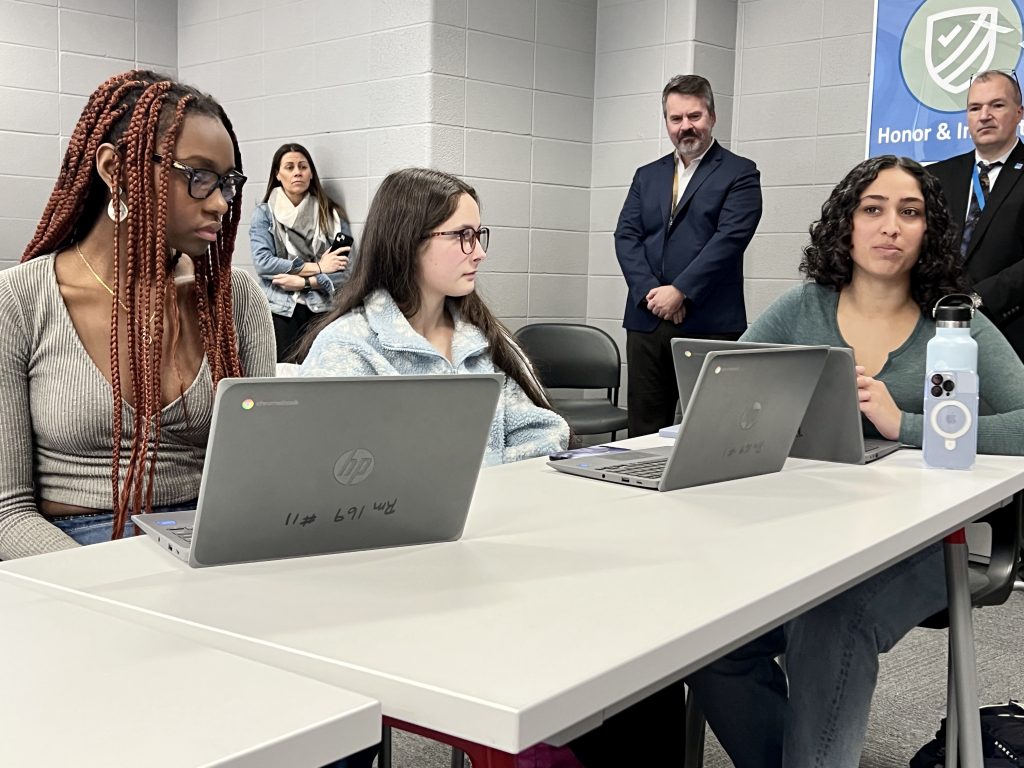
Students at Conard High School share experiences and concerns, and ask questions at a roundtable on teen dating violence prevention. Photo credit: Ronni Newton
The situation described by the first student – coercion, applying pressure to stay away from family and friends – is one of the warning signs of teen dating violence, Blumenthal said.
“He was tricking her in the relationship. She knew it was wrong,” the student said. The now-former boyfriend was calling the others names, telling her her friend he hated them. She was able to get out of the relationship and get help.
“Very often it takes tremendous courage and strength to break an abusive relationship, to leave an abusive relationship,” Blumenthal said. Some who arrive at Interval House leave finally leave and take only what they can carry in a plastic garbage bag, once they finally have the courage to make that break, sometimes because they feel they owe it to their children.
Financial dependence can also be a factor in making it difficult to leave a relationship.
The student who said she had been a victim said people often struggle with the “what if”s.”
In the moment, she said, thoughts can be: “What if it could change. What if things go back to the way it used to be? I think another part of it is overcoming that and realizing that if you don’t leave when you do, you’re never going to. You’re always going talk yourself out of it.”
When asked why people “don’t just leave,” Foster said, “You need to remember something. These are two people who found each other, fell in love, put all their faith, hope, trust in each other. And they built a relationship together. They don’t want it to end. They want it to be fixed. They want it to go back and be what it was,” she said.
“Rarely does that happen. Usually it escalates and it takes great strength to leave.” You don’t know why it turns, or how to stop it.
A student asked how often abusive relationships get to a better place. “I’ve never seen it,” Foster said, and she has been working with domestic violence victims for more than 30 years, including practicing law and representing survivors and victims. “I’m told it can happen but I’ve never seen it. … What I’ve seen is it escalates, it invariably escalates.” Individuals, however, may get help independently to change behavior patterns and go on to have success in future relationships, she said.
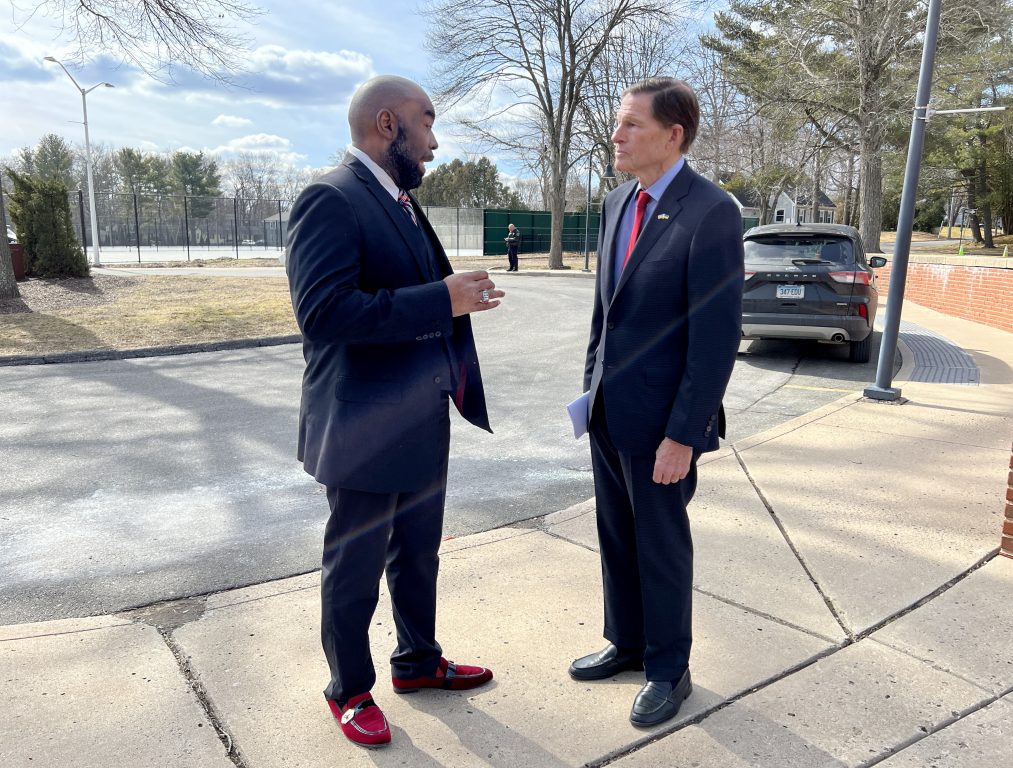
Conard Principal Jamahl Hines speaks with U.S. Sen. Richard Blumenthal outside the school Monday morning. Photo credit: Ronni Newton
Conard Principal Jamahl Hines shared a personal story involving his own family. His 25-year-old stepdaughter is now finally back home after years in an abusive relationship with a woman who tried to cut her off from her family. The family had been trying to help her leave for a year and a half, he said.
Having her back home “has been wonderful, but very, very difficult,” Hines said. She is finally able to get help and has an amazing support system, but he said he’s so thankful to Interval House for providing service to “so many who are out there without a voice … or who don’t know where to go to get their voice heard. … It hits home, it hits home for a lot of folks here.”
As a shelter, Interval House is open only to women and children, but Foster said men are roughly 22% of those they serve and they are eligible for the same advocacy services. She recalled a story of one man, a student, who fled from a violent partner with only his cellphone. An Interval House employee brought him to Walmart so he could at least have some clothing, and a few months later he successfully graduated from medical school.
Interval House is able to access services to translate in 218 languages in order to support the area’s diverse community that includes many immigrants.
They do not have in-house counseling, but have partnerships with agencies and arrangements with some private therapists, although it’s never enough, Foster said.
Foster said the prevalence of domestic violence has grown, particularly since COVID. Interval House has a budget of roughly $4 million, she said, with about $1.6 million spent on salaries and the rest on services. That includes housing victims in hotels, which during COVID that rose to $120,000 per month. It’s now about $15,000 per month, she said.
Interval House clears paths for people to get to a better place in their lives, Foster said.
“What can you do? Tell all your friends and families about us … spread awareness of this issue,” she said. “We can’t save lives if we can’t reach folks.”
Board of Education Chair Lorna Thomas-Farquharson, who attended the roundtable, told the students that before they get into relationships, it’s so important “for you to know who you are,” for young people to know that they are all beautiful and worthy.
“We have all races, religions, cultures … it can happen to anyone,” Foster said. The statistics she cited were: one in three teens, one in four women, and one in seven men.
“As you know from those statistics, it’s probably more widespread than you think, than people are willing to admit. … There’s a lot of denial,” Blumenthal said.
He thanked the teens for their honesty.
The 38 teens who attended the roundtable were students in the Human Relations as well as Introduction to Individual and Family Development classes. The latter, their teacher, Jennifer Vauter said, is a UConn Early College Experience (ECE) class for which they receive college credit.
Administrators said they hope to continue holding this type of forum on a regular basis.

Board of Education Chair Lorna Thomas-Farquharson shares some comments at a roundtable discussion on teen dating violence prevention. Also pictured (from left) are Department Supervisor Brian Cohen, Conard Assistant Principal Jocelyn Tamborello-Noble, and Mayor Shari Cantor. Photo credit: Ronni Newton
Like what you see here? Click here to subscribe to We-Ha’s newsletter so you’ll always be in the know about what’s happening in West Hartford! Click the blue button below to become a supporter of We-Ha.com and our efforts to continue producing quality journalism.


